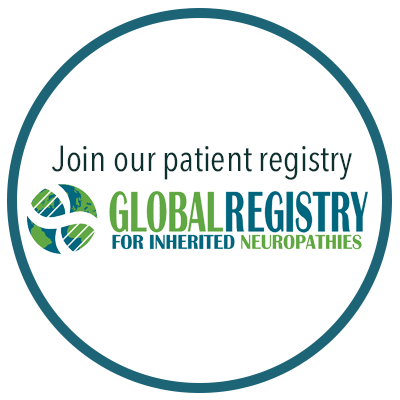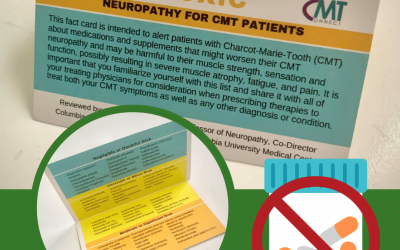Neurotoxic drugs, substances that cause damage to nerves, act directly on individual nerve cells by interfering with membrane proteins.
Overall, the effect of neurotoxic drugs will depend on dosage, but typically results in loss of muscle control and/or feeling. For a person with CMT, this is extremely important. Symptoms can remain dormant, only to be severely increased by a neurotoxic drug. Prevention of progression should focus on avoiding drugs that can affect any pre-existing neurological disease, especially CMT. Medication toxicity is important to recognize when it occurs so that the offending agent can be discontinued, but when possible, preventing exposure to neurotoxic medications all together is preferable.
Spotlight: Corinne Weinstein, Oncology Pharmacist, GRIN Advisory Council member
I was born and raised in Colorado where I attended Regis University. I completed both my undergraduate course work and Pharm.D. there. Currently, I work as an oncology pharmacist at an infusion center in Lafayette, Colorado. As an oncology pharmacist I am in a unique position to help educate my colleagues not only about CMT and other related, inherited neuropathies (i.e HSAN) but also about the detrimental effects neurotoxic chemo can have in a CMT/HSAN patient.
Despite having symptoms of CMT since childhood (high arches, hammertoes) I have never gained an official genetic diagnosis, despite whole genome sequencing. However, my clinical presentation is consistent with an unknown type of, what my neurologist believes to be, hereditary sensory and autonomic neuropathy (HSAN).
Outside of work, I love spending time with my sisters/family, my husband, my 4-year-old son and my two dogs.

Provide this vital information easily to all your healthcare providers when they prescribe a medication!
Individuals affected with neuropathic diseases, such as Charcot-Marie-Tooth, may be more vulnerable to the effects of certain medical conditions, stresses, and medications.
A small number of medications are known to cause damage to nerves or cause neuropathy. These neurotoxic drugs are poisonous or destructive to nerve tissue, and can cause a loss of muscle control and/or nerve sensation.
CMT patients and their health care providers need to be aware about the medications that might worsen their neuropathy and be harmful to their strength, sensation, and function. Symptoms of CMT can remain dormant, only to be severely increased by neurotoxic drugs. Prevention of progression should focus on avoiding the medications that can affect any pre-existing neurological disease.
Most of the neurotoxic drugs fall into two broad categories: chemotherapies and antibiotics. However, numerous other treatments are also known to cause nerve injury and each must be evaluated before administration. With each medication, the risk of exposure must be weighed against the benefit of use.
There is only one example of a treatment that must be avoided in all circumstances. The chemotherapy agent vincristine may cause severe weakness and nerve injury after only 1 or 2 doses in patients with minimal or unknown CMT1A, the most common form of Charcot-Marie-Tooth.
While most all other treatments carry a relative, but not absolute risk of use, it’s imperative to always discuss any known family history of CMT with your health care providers before taking any medication.
Neurotoxic Rx wallet card
Neurotoxic wallet card.
Neurotoxic Drugs & Charcot-Marie-Tooth Disease: What You Need To Know
CMT patients and their health care providers need to be aware about certain neurotoxic drugs that might worsen their neuropathy.
Neurotoxic Drugs and Charcot-Marie-Tooth Disease
Do you know about the dangers that neurotoxic drugs hold for patients with Charcot-Marie-Tooth disease?
CMT Personal Story: Chemotherapy and Charcot-Marie-Tooth
Learn how chemotherapy jump-started CMT in Karen’s body, leaving her in leg braces for several months.






